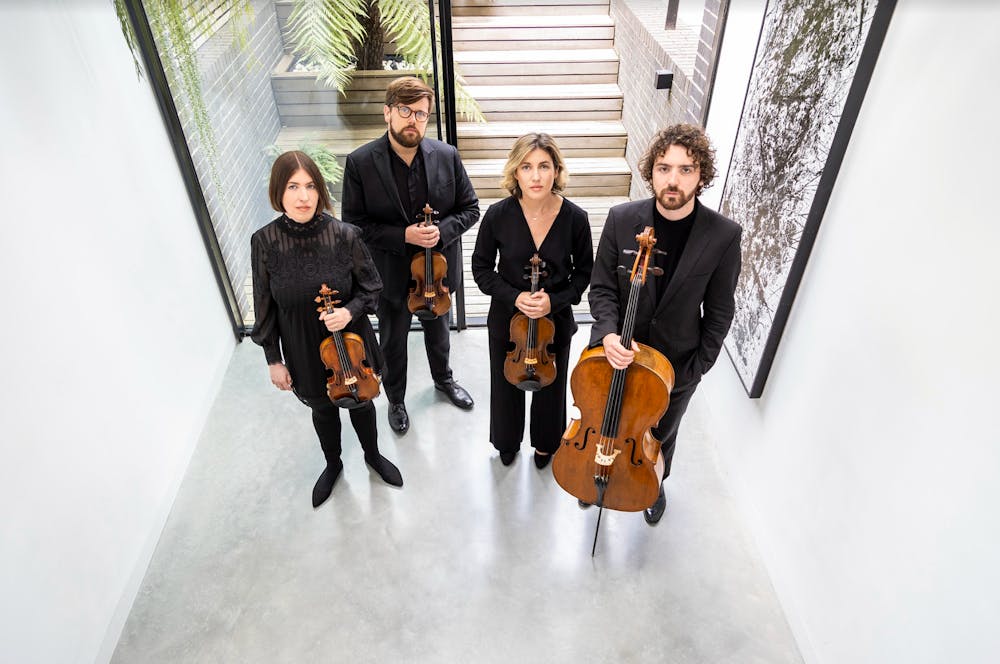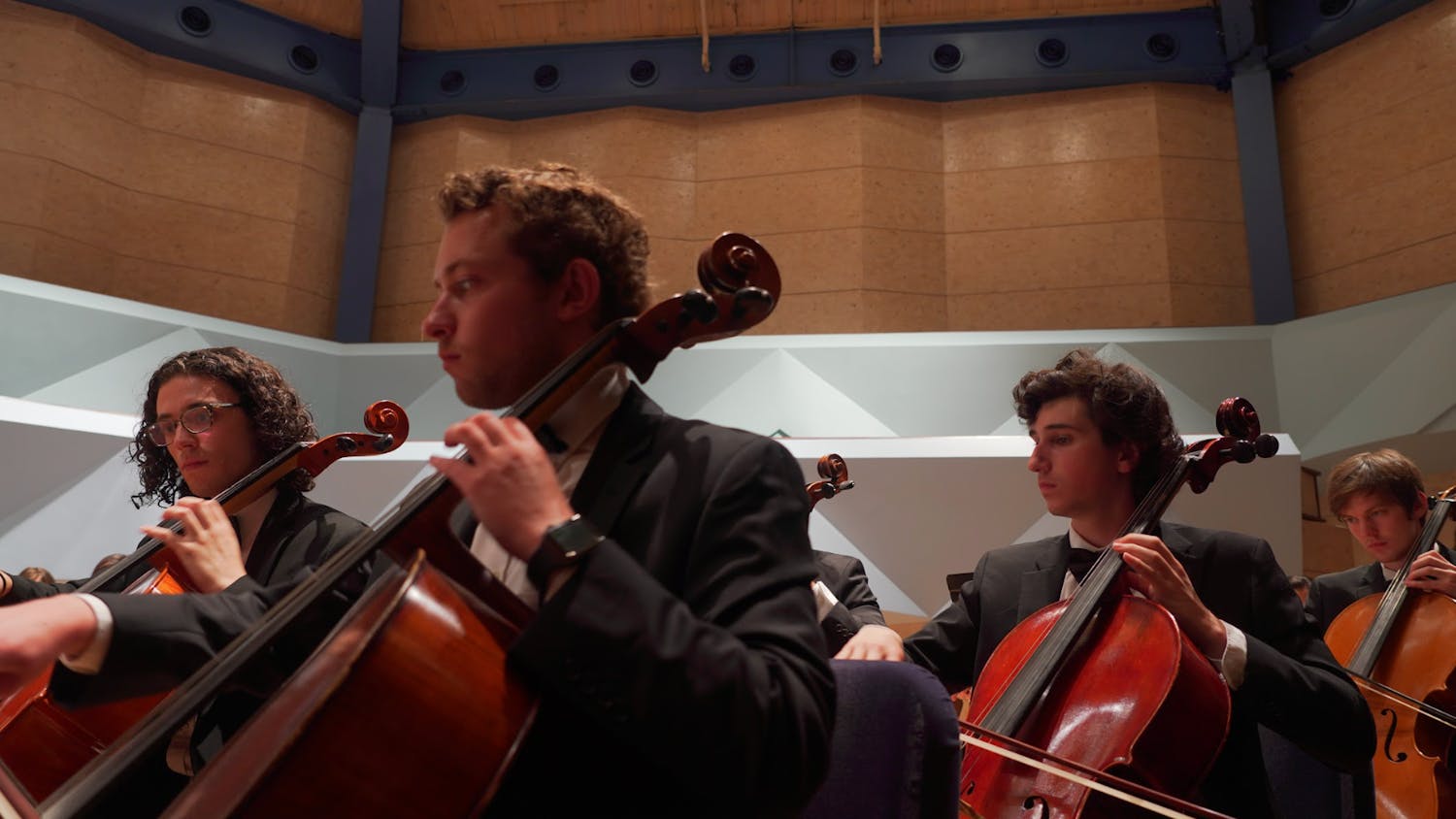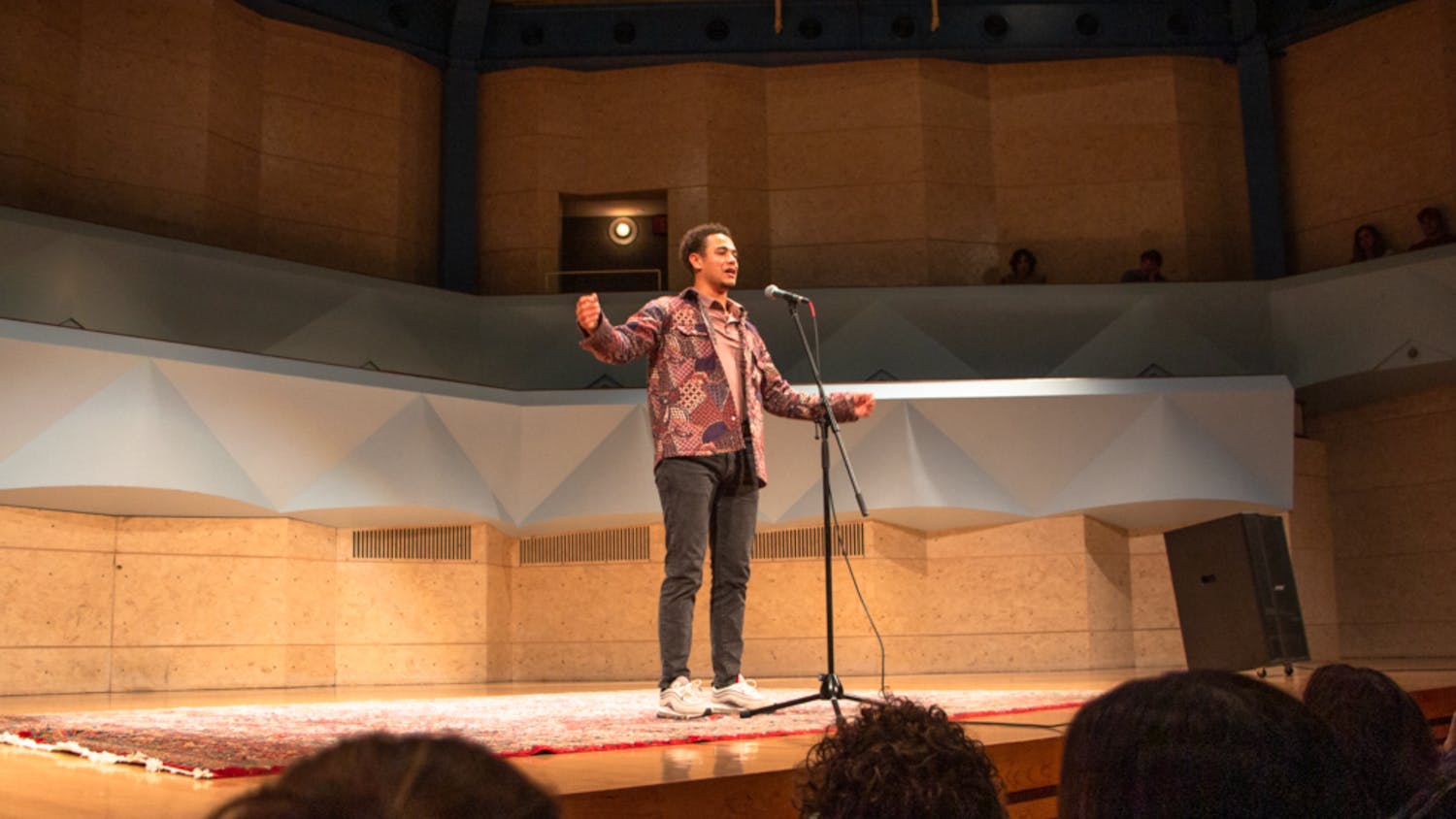Many eager admirers of classical music braved the inclement weather and made the journey to Robison Hall on Friday, Nov. 11, when the Castalian Quartet returned to Middlebury for the first time since 2019. Named for the Ancient Greek spring that bestowed poetic inspiration upon those who drank its waters, the quartet compelled its audience to leave their soaked raincoats and dripping umbrellas at the door and dive headfirst into the mythic currents of its stunning music.
Director of the Middlebury Performing Arts Series Allison Coyne Carroll introduced the group by describing the relationship between Middlebury and the Castalian Quartet. The story began when she witnessed the group’s breathtaking and riveting performance at the 2016 Banff Quartet Competition, a showing that ultimately won Third Prize. Her experience at that concert led to the inclusion of Middlebury on the group’s debut U.S. tour in 2019.
“I was thrilled to secure Middlebury that performance, and we were wedged in between Washington D.C.’s Phillips Collection and New York’s Lincoln Center,” Carroll said. “I’m glad I am able this fall to please the many patrons who came up to me after that concert and asked me when I would re-engage [the Castalian Quartet] again.”
Throughout their two-hour performance, the group of four masterful musicians unfolded themes of jealousy, introspection and joy throughout three pieces: Leoš Janáček’s String Quartet No. 1 (Kreutzer Sonata), Jean Sibelius’ String Quartet in D minor, Op. 56 (Voces intimae) and Ludwig van Beethoven’s String Quartet in B-flat Major, Op. 130, with Grosse Fuge, Op. 133.
The first quartet, Leoš Janáček’s String Quartet No. 1, was inspired by Tolstoy’s dark novella, “The Kreutzer Sonata.” “Pitting violent motifs against more heartfelt lyricism, Janáček creates a series of confrontations, as if between husband, represented by the former, and wife, described by the latter,” a note from the program read.
The impassioned performance captured emotional frenzy and cathartic struggle as each musician urgently raced one another through the melody to pull the audience deeper into the emotional conflict. It was as if the Castalian Quartet and its captive listeners were rushing toward the edge of a cliff, unsure of what lay ahead but unable to stop even in the face of danger. Hearing the sharp, dramatic exchanges between instruments in contrast to the slow, startling moments of quiet felt like witnessing the death throes of a once-bright love. The final movement was the quiet resolution of internal turmoil punctuated by one last cry that quietly faded into harmoniously stunned silence.
The second piece, Sibelius’ String Quartet in D minor, Op. 56 (Voces intimae), held a special significance for the Castalian Quartet’s leader, violinist Sini Simonen. She described how the composer’s use of folk music in search of the Finnish identity was deeply personal for her, as someone born in Finland who has left her home to live and perform abroad.
“When you grow up in Finland, Sibelius is just something that is incredibly central to us… It’s all around. It’s the kind of harmonic language that just feels like home,” Simonen told the audience. “This piece has all the strength, love and eccentricity that one could ever wish for.”
The piece was inspired by the thoughtful reflections of Sibelius on Finland and his national identity. It uses traditional scales and Germanic folk music that the quartet poignantly illuminated. The piece’s musical brilliance came from how its resounding, melodious flow felt like a celebration of something both eccentric and nostalgic. It was like a conversation between old friends who know each other’s past but struggle to understand their present. The complex emotions conjured by this piece may be similar to anyone away from their home like Simonen or students who spend months or even years away at college. This was a piece for those who wonder how they can feel like a stranger in a place they once knew so well.
The skill of each performer shined through the piece’s five movements as the challenging composition demanded their individual excellence merge together in astonishingly swift pace. The musician’s nimble fingers and soaring bows danced across strings and weaved through the full range of their instruments. The fiery and piercing finale raced forward with incomprehensible speed and urgency towards the triumphant, powerful end that left no doubt of the Castalian Quartet’s capabilities.
“[Sibelius] had a rowing accident when he was very young and had to stop having any professional dreams. Sometimes I think he almost made his revenge in this piece to ensure that violinists ever after would suffer,” Simonen joked. “It’s a wonderful piece, but it’s really hard.”
The final quartet was Beethoven’s String Quartet in B-flat Major, Op. 130, with Grosse Fuge, Op. 133, which ended the night on the group’s most complex and lengthy piece. The early movements shift from intensely fast to delicately slow, from the D-flat key to the distant and unexpected G-flat. The piece’s cyclical tension is expertly conveyed through the Castalian Quartet’s mastery of each moment of their performance. The musicians understood how to shift between such contradictions without losing the audience, and in doing so delivered them to the grand finale of the night.
The final movement of this piece, Grosse Fuge (Op. 133), was originally replaced by a lighter conclusion because it was seen as incomprehensible and unplayable. The program notes that “the fugue is a mighty struggle stretching mind and sinews to the limit,” but the Castalian Quartet successfully conquered Beethoven’s majestic and joyful finale in the cathartic culmination of their performance.
As the audience emerged from Robison Hall, gathering their umbrellas and coats to return home, the soft falling of rain returned them to reality. The cascading showers felt as though the Castalian Spring had opened in the town of Middlebury that night and poured out its brilliant, musical waters for all those who had made the journey.

Ryan McElroy '25 (he/him) is the Editor in Chief.
Ryan has previously served as a Managing Editor, News Editor and Staff Writer. He is majoring in history with a minor in art history. Outside of The Campus, he is co-captain of Middlebury Mock Trial and previously worked as Head Advising Fellow for Matriculate and a research assistant in the History department. Last summer Ryan interned as a global risk analyst at a bank in Charlotte, North Carolina.




